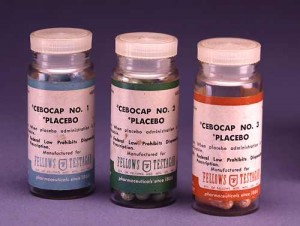Statistics Definitions > Treatment-As-Usual
What is “Treatment-As-Usual”?
Treatment-As-Usual (TAU) means that the usual treatment — according to accepted standards for your particular discipline — is given to a group of participants. For example, psychiatric TAU might include psychotherapy, medication, or a combination of the two (Blais et. al, 2013).
In clinical trials, TAU is given to the control group, while an experimental treatment is given to the experimental group.
TAU vs. Control Group

The control/TAU are often confused, perhaps because the control is seen by many authors as not much more than an essential element of an experiment. For example, this study on Obsessive Compulsive Disorder had a TAU group that “received no treatment.” This is clearly a control group; “no treatment” is not an accepted treatment protocol for OCD; According to the OCD Foundation, the accepted treatment for OCD includes Cognitive Behavior Therapy and/or medication. In his British Journal of Psychiatry article End of the road for treatment-as-usual studies?, Tom Burns said “We pay [TAU] almost no attention, not even enough to define it properly” and goes on to note that many small studies fail to provide even the most basic information about what TAU is.
References:
Blais, M. et. al (2013). Treatment as usual (TAU) for depression: a comparison of psychotherapy, pharmacotherapy, and combined treatment at a large academic medical center. Psychotherapy (Chic). Mar;50(1):110-8. doi: 10.1037/a0031385.
Burns, T. (2009). End of the road for treatment-as-usual studies. The British Journal of Psychiatry, Jun, 195 (1) 5-6. Retrieved January 31, 2017 from: http://bjp.rcpsych.org/content/195/1/5
Gava, I. et.al (2007). Psychological treatments compared with treatment as usual for obsessive compulsive disorder. Cochrane Library.
Gonzales, R. (2015). Beyond [TAU] for Major Mental Illness. Retrieved February 1, 2017 from: http://cetcleveland.org/wp-content/uploads/2015/12/Beyond-Treatment-As-Usual.pdf
International OCD Foundation. How Is OCD Treated? https://iocdf.org/about-ocd/treatment/